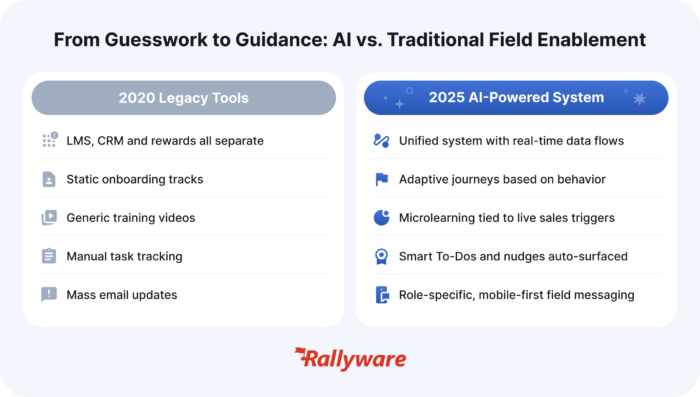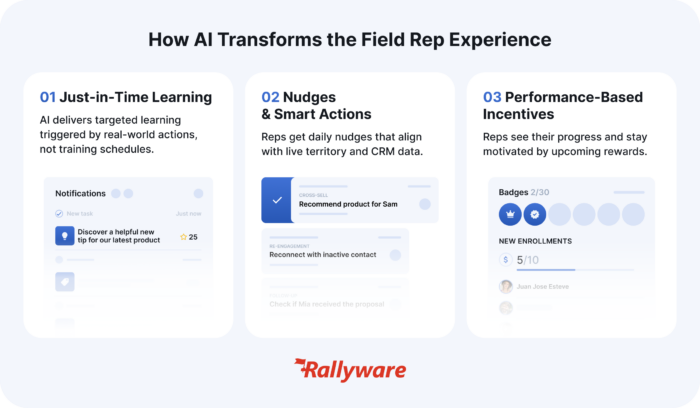Three Ways to Streamlining and Scaling Communication Between HQ, Uplines and Downlines
Field enablement in 2025: How AI has changed the game
Field enablement teams do not have time to waste. In 2025, the best-performing companies are not giving reps more content. They are giving them better timing.
AI is changing how distributed teams learn, sell, and execute. What used to be static training is now a dynamic, intelligent system that adapts in real time to rep behavior, performance gaps and customer signals.
And it is working.
Organizations that invest in AI-powered enablement are seeing shorter ramp times, stronger retention, and more consistent field performance. For teams operating across retail, direct selling, and service-based industries, this shift is no longer optional. It is the new baseline.
The old playbook is slowing you down
Most enablement systems were built for a different sales cycle. Traditional tool track completions but do not tie anything to results. Sales aids are buried in portals. Coaching comes too late. Updates go unread.
Field teams are left overwhelmed and underprepared.
According to Gartner’s 2025 Sales Enablement Leadership Vision report, overwhelmed sellers are 45 percent less likely to hit quota. Simplifying the rep experience is no longer a nice-to-have. It is a revenue imperative.
Related: Sales enablement software in 2025: What actually drives performance

What AI is doing differently
AI-powered field enablement platforms are built for speed, scale, and precision. They use real-time performance data to deliver personalized guidance in the flow of work. That includes:
- Onboarding journeys tailored by region, role, and behavior
- Nudges triggered by CRM activity or territory performance
- Microlearning linked to product drops or rep-level skills gaps
- Incentives based on actual results rather than rank or assumptions
- Risk alerts that flag disengagement before it impacts sales
As George Elfond, CEO of Rallyware, explains in Sales Enablement 3.0, this is not about content engagement anymore. It is about behavior activation.
Four ways AI is transforming field enablement
1. Onboarding that adjusts in real time
Most onboarding programs are one-size-fits-all. Reps complete the same path regardless of experience, speed, or performance. That leads to longer ramp times and uneven results.
AI changes that. The system adapts based on each rep’s actions, pace, and outcomes. Those who excel get accelerated coaching. Those who struggle receive targeted reinforcement.
Salesforce’s 2024 State of Sales report found that high-performing teams are 4.2 times more likely to personalize onboarding using AI.
2. Learning in the moment of need
Reps do not have time for 30-minute videos or weeklong training pushes. Learning must happen when and where it matters. AI delivers short, relevant updates in response to activity in the field. For example, a new product launch can trigger SKU highlights, objection handling tips, or pricing guidance.
This kind of timing matters. Harvard Business Review reports that reps still spend 65 percent of their time on non-selling activity. AI helps them recover that time by turning information into action.
Related: Direct selling software in 2025: What smart buyers are investing in
3. Communication that reaches reps where they are
Mass emails and general alerts rarely get seen. AI allows organizations to deliver updates through the channels reps use, such as mobile notifications, in-app messages, or embedded tasks. Communications are prioritized, role-based, and location-specific.
This ensures that compliance alerts, product changes, and sales guidance reach the right people at the right time, without adding noise or delay.
Deloitte’s 2025 Future of Work in Sales report found that 70 percent of teams using AI-driven communications tools saw faster campaign adoption and better execution in the field.
4. Measurement tied to outcomes
Legacy systems track how many modules were completed. AI platforms measure what changed after those modules were delivered. Did close rates improve? Did reps hit their targets faster? Did retention increase?
With Rallyware, every training session, task, and incentive is connected to a measurable business goal, from revenue per rep to conversion by store.

What does this mean for distributed teams?
For distributed or lightly managed sales forces, AI-first enablement can mean the difference between scattered effort and scalable performance. This applies to:
- Direct selling organizations managing large independent rep networks
- Retail brands with thousands of store associates
- Home-service teams with minimal field oversight
In these environments, traditional tools fall short. Rallyware delivers enablement that adjusts automatically based on role, rank, behavior, and geography.
Reps see the right task, learning module, or incentive at the exact moment it is needed. Leaders gain visibility into what is working and where support is needed.
Final word: It is not just training anymore
AI has redefined field enablement. In 2025, enablement is no longer about uploading content. It is about shaping performance.
The best platforms do not just track what reps complete. They help reps improve, right in the flow of work.
If your enablement system cannot deliver timely guidance, adapt to performance data, or connect to revenue goals, it is falling behind.
Rallyware is built to keep your field moving forward.
News and Insights on Workforce Training & Engagement
We’re among top-notch eLearning and business engagement platforms recognized for effective training and talent development, helping to empower distributed workforces
Subscribe
